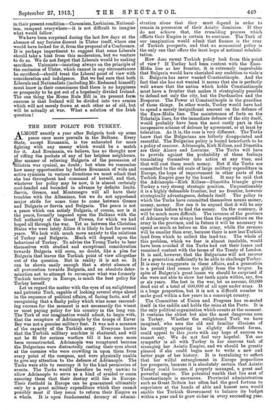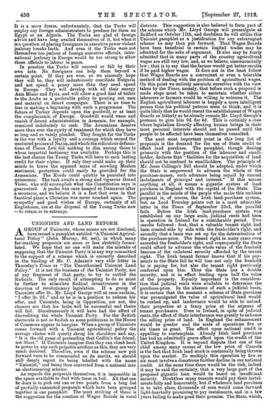THE BEST POLICY FOR TURKEY.
_ALMOST exactly a year after Bulgaria took up arms peace once more prevails in the Balkans. Every State, except Roumania, is too exhausted for more fighting with any enemy which would be a match for it. And. Roumania, we believe, has no thought now of rifling the pockets of any of her helpless neighbours. )Her manner of relieving Bulgaria of the possession of 'Silistria was cynical, no doubt ; but when we remember how many opportunities lay before Roumania of wide and active cynicism in various directions we must admit that she has throughout had command of herself, and that, whatever her policy may be now, it is almost certainly cool-headed. and. bounded in advance by definite limits. Servia, Greece, and Montenegro will all have their troubles with the Albanians, but we do not apprehend major strife for some time to come between Greece and. Bulgaria or Servia and Bulgaria. The peace is not a peace which can satisfy Bulgaria, of course, nor is it the peace, formally imposed upon the Balkans with the full authority of the Great Powers, for which we had hoped all through the war. Yet as between the Christian States who were lately Allies it is likely to last for several years. We look with much more anxiety to the relations of Turkey and. Bulgaria. Much will depend upon the behaviour of Turkey. To advise the Young Turks to bear themselves with studied and. exceptional consideration towards Bulgaria will seem, no doubt, like a plea for Bulgaria that leaves the Turkish point of view altogether out of the question. But in reality it is not so. It can be shown easily enough that a strict absence of all provocation towards Bulgaria, and an absolute deter- mination not to attempt to reconquer what was formerly Turkish territory in Europe, is much the best policy for Turkey herself.
Let us regard the matter with the eyes of an enlightened and patriotic Turk, capable of looking several steps ahead in the sequence of political affairs, of facing facts, and of recognizing that a flashy policy which wins some resound- ing success for the moment is not necessarily the wisest or most paying policy for his country in the long run. The Turk of our imagination would admit, to begin with, that the recapture of Adrianople by the troops of Enver Bey was not a genuine military feat. It was not a measure of the capacity of the Turkish army. Everyone knows that the Turkish military machine is shattered, and will not be fit for serious warfare till it has once more been reconstructed. Adrianople was recaptured because the Bulgarians were distractedly casting their eyes about at the enemies who were crowding in upon them from every point of the compass, and were physically unable to give any attention to the defence of Adrianople. The Turks were able to reoccupy it by the kind permission of events. The Turks would therefore be very unwis3 to allow Adrianople to serve as a kind of symbol or omen assuring them that their destiny still lies in Europe. Their foothold in Europe can be guaranteed ultimately only by a great military expenditure which they cannot possibly meet if they mean to reform their Empire as a, whole. It is upon fundamental decency of admini- stration alone that they must depend in order to remain in possession of their Asiatic dominion. If they do not achieve that, the crumbling process which afflicts their Empire is certain to continue. The Turk of our imagination, would admit that finance is the crux of Turkish prospects, and that an economical policy is the only one that offers the least hope of national rehabili- tation.
How does recent Turkish policy look from this point of view ? If Turkey had been content with the Enos- Midia line as her frontier, it is extremely improbable that Bulgaria would have cherished any ambition to violate it. Bulgaria has never wanted Constantinople. And the fact that she has not wanted it means that she is perfectly well aware that the nation which holds Constantinople must have a frontier that makes it strategically possible to defend not only the city, but the Dardanelles and the Bosporus. The Power at Constantinople is the guardian of those things. In other words, Turkey would have had to spend a merely insignificant amount on the defence of the Enos-Midia line. The maintenance of forts on the Tchatalja lines, for the immediate defence of the city itself, would. probably have been the most costly part in this inexpensive scheme of defence by agreement, or at least by toleration. As it is, the case is very different. The Turks know that the Bulgarians are bitterly disappointed. and resentful. The Bulgarian policy is bound henceforth to be a policy of rancour. Adrianople, Kirk Kilisse, and Dituotika are their Alsace and. Lorraine. The Turks will have to provide against the probability of these feelings translating themselves into action at any time, and that will cost them much money. But if the Turks are committed to the old scale of large military expenditure in Europe, the hope of improvement in other parts of the Turkish Empire goes by the board. It may be said that the Adrianople—Kirk Kilisse—Dimotika triangle gives Turkey a very strong strategic position. Unquestionably it is a highly defensible frontier, but no frontier, however strategically advantageous, defends itself. The policy to which the Turks have committed themselves means money, money, money. Nor can it be argued. that it will be any easier than before to find the money. On the contrary, it will be much more difficult. The revenue of the province of Adrianople was always less than the expenditure on the army in the province, and in future it will be necessary to spend as much as before on the army, while the revenue will be smaller than ever, because there is now less Turkish land from which to collect the land-tax. The whole of this problem, which we fear is almost insoluble, would have been avoided if the Turks had cut their losses and remained content with the terms of the Treaty of London. It is said, however, that the Bulgarians will not recover for a generation sufficiently to be able to challenge Turkey.
It is easy to exaggerate in these affairs, and a generation is a period that comes too glibly from the tongue. In spite of Bulgaria's great losses we should be surprised if she were not able to show her teeth again within, say, five or six years. She lost in the war, let us assume, 60,000 dead out of a total of 600,000 of all ages under arms. It is a huge proportion, but it is not a difficult number to make good within a few years in a conscript country.
The Committee of Union and Progress has re-seated itself in the saddle and holds the reins at the Porte. It is the only political organization which counts at the moment. It contains the ablest but also the most dangerous men in Turkey. Whether the enlightened Turk we have imagined, who sees the old and familiar illusions of his country appearing in slightly different forms, could appeal to this junta with any hope of success we cannot say. We do not feel very hopeful. Yet our sympathy is all with Turkey in her onerous task of managing her Asiatic Empire, and we should be greatly pleased. if she could. begin now to write a new and better page of her history. It is tantalizing to reflect that her wilful entanglement in Europe jeopardizes her prospects, because it is absolutely certain that Asiatic Turkey could become, if properly managed, a great and powerful empire. The potential wealth that lies east of Constantinople is enormous. Provincial administration such as Great Britain has often had the good fortune to experience at the hands of able and honest men would enable the Turkish Government to balance its budget within a year and to grow richer in every succeeding year. It is a mere dream, unfortunately, that the Turks will employ any foreign administrators to produce for them an Egypt or an Algeria. The Turks are glad of foreign advice and have long availed themselves of it, but when it is a question of placing foreigners in executive power violent jealousy breaks forth. And even if the Turks were not themselves too jealous of foreign executive officials, inter- national jealousy in Europe would be too strong to allow those officials to labour in peace. In practice the Turks will succeed or fall by their own acts. No foreigners can help them beyond a certain point. If they are wise, as we sincerely hope they will be, they will industriously conciliate Bulgaria and not spend a penny more than they need spend in Europe. They will develop with all their energy Asia Minor and Syria, and will allow a good deal of tether to the Arabs as a preferable policy to pouring out men and material on desert campaigns. There is no time to lose in making a beginning with such a programme. The future of Turkey depends upon the goodwill, or at least the complaisance, of Europe. Goodwill would wane and vanish if decent administration in Armenia, for example, remained indefinitely to seek. The Armenians deserve more than ever the equity of treatment for which they have so long and so vainly pleaded. They fought for the Turks in the war with a loyalty and a courage which earned the unstinted praises of Nazim, and which the ridiculous defama- tions of Pierre Loti did nothing to dim among those to whom impartial testimony was available. Perhaps this is the last chance the Young Turks will have to earn lasting credit for their regime. If only they could make up their minds to brave the opposed mass of scowling Moslem sentiment, protection could easily be provided for the Armenians. The Kurds could quickly be punished into quiescence. The task awaits a strong and vigorous Grand Vizier, who will accomplish what the Constitution says is guaranteed. A pasha was once hanged at Damascus after a massacre, and we believe it is a fact that even in that fanatical place a Christian was never touched again. The sympathy and good wishes of Europe, certainly of all Englishmen, are at the disposal of the Young Turks now —to retain or to estrange.











































 Previous page
Previous page